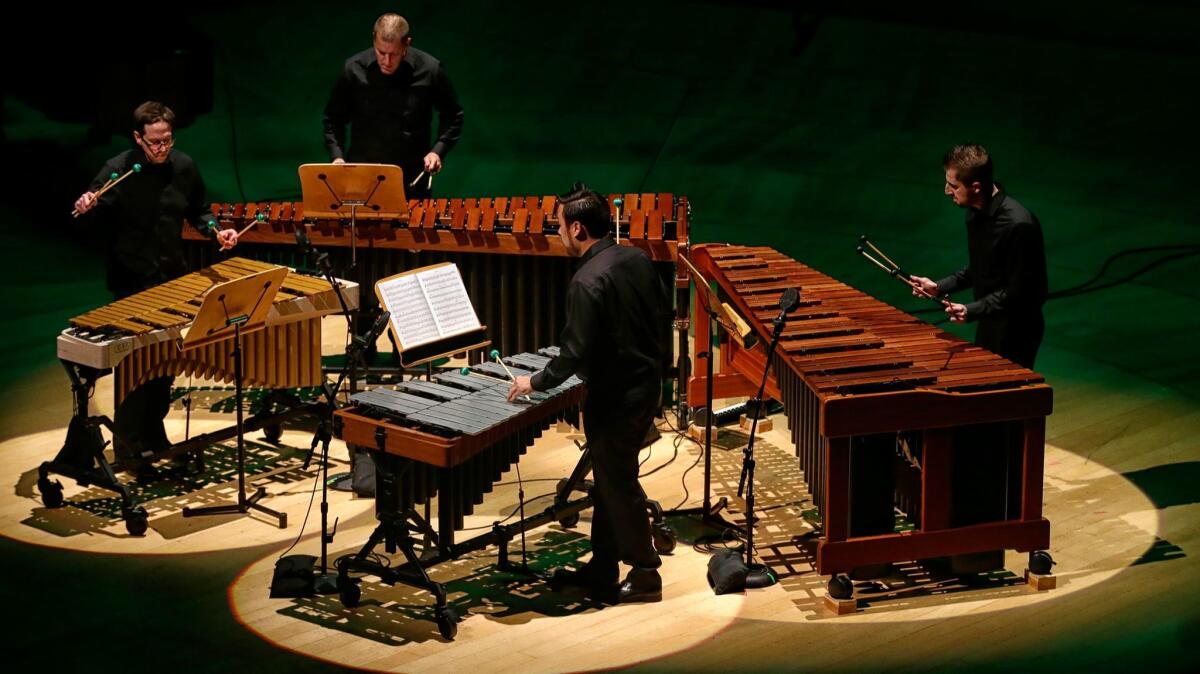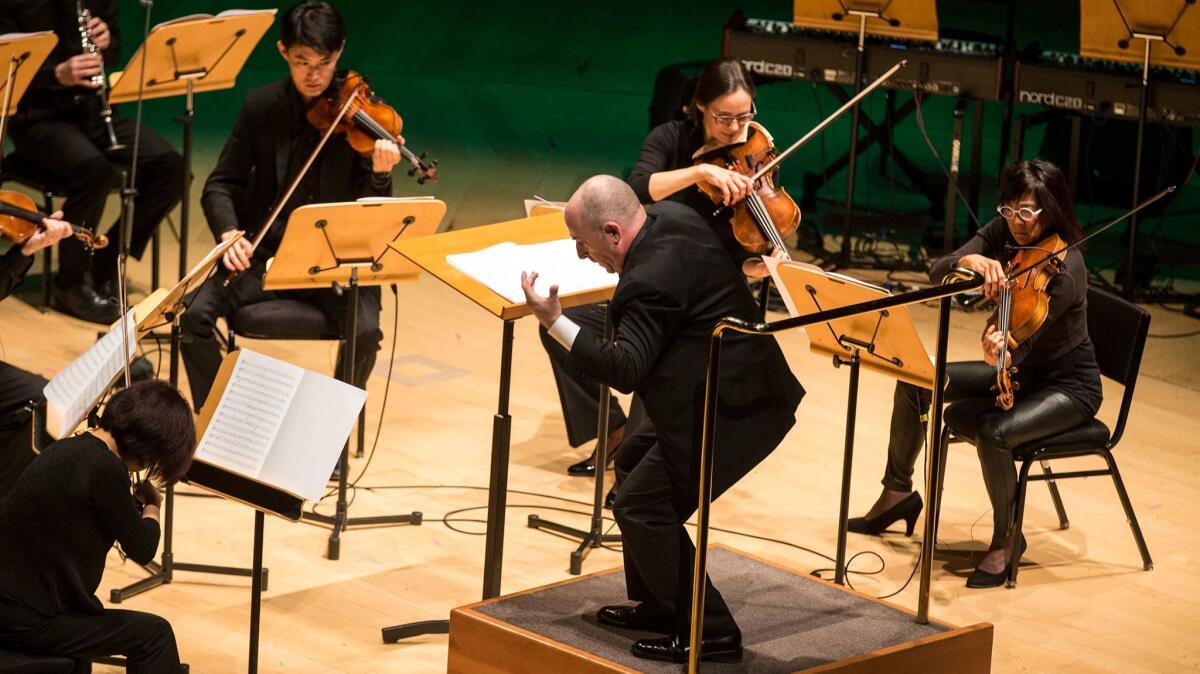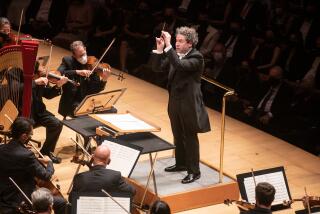Review: Steve Reich at 80, his finger on the pulse of a bewildered country

A performance of “Mallet Quartet” in a concert by the L.A. Philharmonic’s New Music Group, which is celebrating composer Steve Reich.
There was, maybe, one minor thing wrong with the LA Phil New Music Group’s all-Steve Reich program, a celebration of the composer’s 80th birthday, at Walt Disney Concert Hall on Tuesday night. Some of the percussion a small some of the time was a tad over-amplified.
Everything else, everything that mattered in a concert that mattered more than even longtime Reich fanatics might have anticipated, was right. All was right in that the performances were excellent. All was right in that the new piece, “Pulse,” a co-commission by the Los Angeles Philharmonic and given its West Coast premiere, is a keeper.
But the real rightness was something more important. It came in the slow section of “Tehillim,” Reich’s joyous 1981 setting of Hebrew Psalm texts for four solo, angelically high and pure-voiced women’s voices and a small instrumental ensemble with plenty of percussion.
The text here is tweet-length stanza from Psalm 18 that could well serve as a manual for how to serve a bewildered country as it turns, turns, turns during inauguration week to the avidity of pundits or the perversions of rash discourse rather than the wider vision of artists.
The English translation reads:
“With the merciful You are merciful, with the upright You are upright. / With the pure You are pure, and with the perverse You are subtle.”
Reich, who turned 80 in October, is a grand old man of Minimalism, but not the only one. America happens to be a great country of old Minimalists: Terry Riley is 81, and Philip Glass turns 80 at the end of this month. In the 1960s, the movement’s radical use of repetition, along with basic harmonies and melodies, was received as a perversion of progressive musical discourse. Subtleties, always there, took time to be appreciated and developed.
“Tehillim” was a key work for Reich and for Minimalism. His model was early Renaissance polyphony, in which musical lines formed interlocking patterns and canons (the technique of overlapping voices found, in simple form, in “Row, Row, Row Your Boat”) and harmonies were pure, open intervals that felt as though they represented the spiritual vastness of the universe.
The pulse is there in “Tehillim,” and Reich, running the amplification mixing board as he loves to do, made sure you head the percussionists beating it out with sticks or clapping hands, to the point of initially drowning out the superb Synergy Vocals, a British ensemble.
That pulse, however, had its purpose. It got the heartbeat where Reich wanted it, helping Psalm texts enter not just the consciousness but also bloodstream of the listener. With bouncing beat and enthusiastic melodic repetitions, always subtly varied, Reich, in the second part, drives in the line, “Guard your tongue from evil and your lips from speaking deceit.”
But it is the nobility of the slow movement’s three-note pattern, which expands and contracts as necessary, where Reich reaches a quiet yet climactic sublimity. The path suggested by the Psalms, when subtly deployed by ancient musical arts decanted in new bottles, becomes a prudent device for disrupting perversion.
Jeffrey Milarsky was the evening’s thorough conductor, maintaining order and enthusiasm.
“Tehillim” is not new to the L.A. Phil. A full-orchestra version was a highlight of the orchestra’s first Minimalist Jukebox Festival 11 years ago. But there is a bite and vitality in the original that makes the text’s point and the delight of the celebratory final movement all the more immediate.

“Pulse,” which had its premiere at Carnegie Hall in October, is, on the other hand, unusually quiet and understated Reich. One can talk about a late style here, but with caution, since he has another new piece, “Runner,” intended for dance, that is as lively as ever. (It will have its U.S. premiere in Berkeley this month.)
But in “Pulse,” written for a chamber orchestra of woodwinds and strings with a piano and electric bass playing a continual pulse for 15 minutes, the mood remains reflective. It is based on a single, quirky melody in constant, telling transformation that is as close to a Beethoven late slow quartet movement that Reich is ever likely to get.
As with “Tehillim,” the melody flows in ever changing canon. Each repetition feels in retrospect as if it were predictable. The lyricism, gorgeous instrumental textures and affecting harmonies are not exactly easy listening but genially and spiritually alluring. The genius of “Pulse” is that you never really know where the score is going, just why it is going there.
The concert began with “Mallet Quartet,” another recent work and echt Reich. A pair of vibraphones and two long marimbas clatter away in rhythmic patterns that go in and out of phase, creating a rush of ringing sound that takes away all possible thought of anything else.
A few moments of hypnotic escape from the 24/7 news feed isn’t such a bad thing either on inauguration week, and kudos to the players — Matthew Howard, James Babor, Jeffrey Grant and Nick Terry — for nailing it.
ALSO
L.A. Opera plans production with Lyric Opera of Chicago, Joffrey Ballet
Jacaranda unleashes a tribute to composer John Adams that goes a little bit ‘Berserk’
Emma Stone and Ryan Gosling’s dancing in ‘La La Land’: beautiful magic or overrated misstep?
More to Read
The biggest entertainment stories
Get our big stories about Hollywood, film, television, music, arts, culture and more right in your inbox as soon as they publish.
You may occasionally receive promotional content from the Los Angeles Times.







